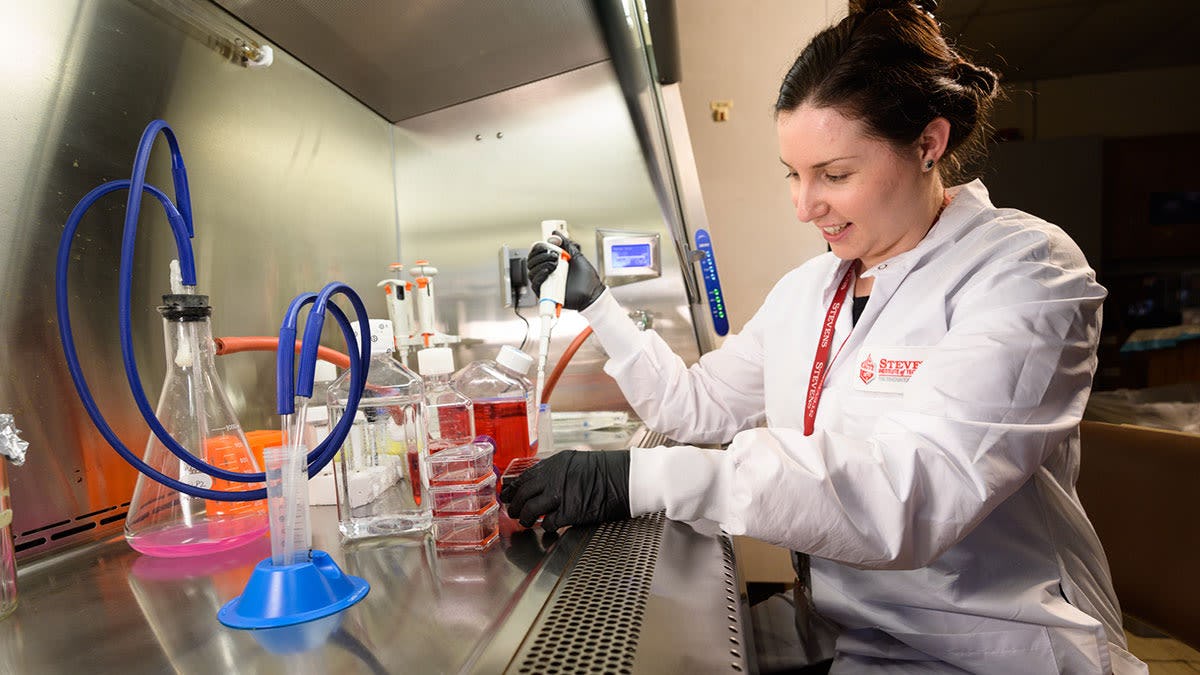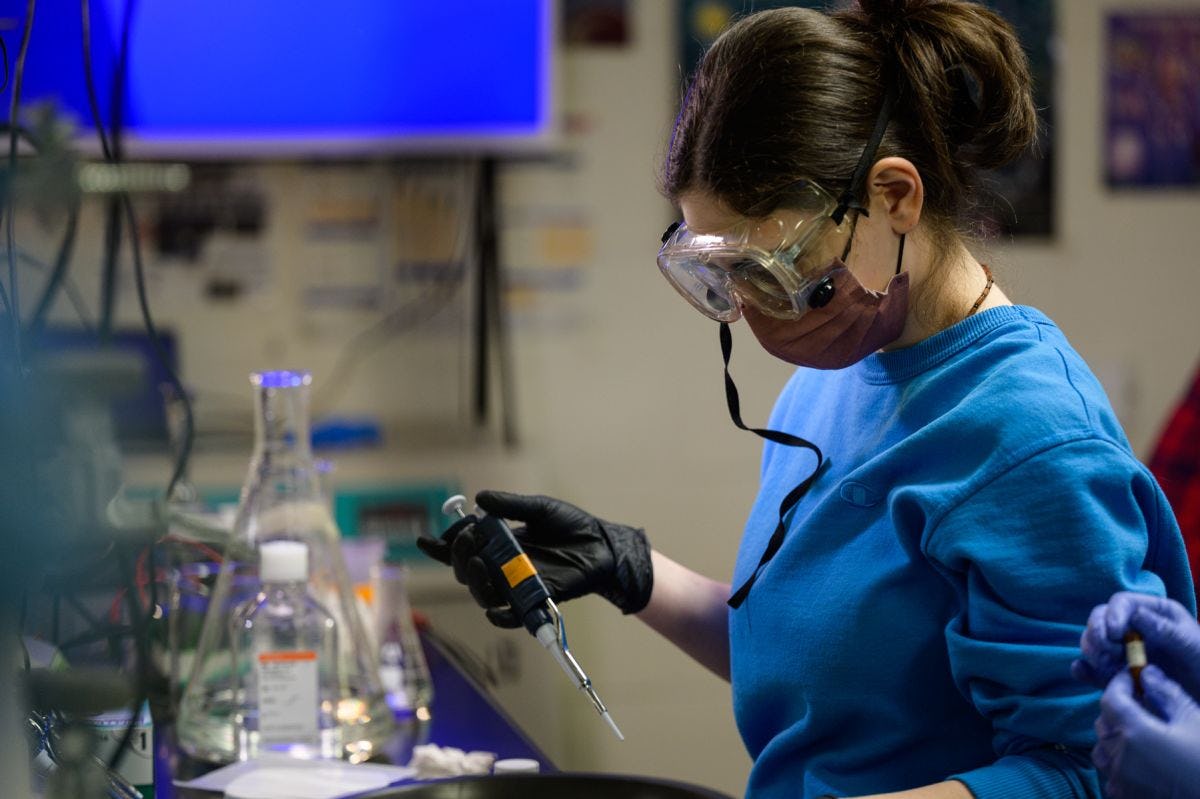
Chemical Biology Doctoral Program
Program Details
Degree
Doctor of PhilosophyDepartment
Chemistry and Chemical BiologyAvailable
On campusDevelop the deep expertise you need to drive innovations in cancer biology, drug discovery and development, genetics and more with a Ph.D. in chemical biology.
Stevens’ interdisciplinary chemical biology doctoral program trains students to investigate biological problems, use advanced statistical methods and interpret the kinetic parameters of biological reactions. You’ll also work alongside expert faculty to conduct independent research in areas like cell and molecular biology, physiology, organic chemistry and computational chemistry. Our graduates are well-prepared for careers in academia as well as industry and medicine, and they assume roles such as research scientist, pharmaceutical chemist and materials scientist.
The Department of Chemistry and Chemical Biology offers dynamic opportunities to explore leading-edge research within a close community of faculty mentors. You'll be able to study under a faculty mentor in the area that you find most exciting:
Cancer Biology
Drug Discovery and Development
Genetics
Cell and Molecular Biology
Physiology
Organic Chemistry
Computational Chemistry
Other opportunities
Unique courses such as Molecular Biology Laboratory Techniques and Biochemical Laboratory Techniques, as well as electives such as Computational Biology
Research using real data sets
Collaboration with other universities and adjunct faculty who work in the pharmaceutical industry for companies such as Merck
Opportunities to work closely with experts in cancer biology, drug discovery, genetics and cellular and microbiology
Experience working in or with national research centers
An independent research project spanning several years
The Stevens Advantage: Widen Your Career Options
Because Stevens is located near both New York City and the New Jersey research corridor, students have access to valuable partnerships with the many industry leaders, renowned academic institutions and national research centers headquartered in our region.
Learn more about what makes graduate education from Stevens a unique experience:
Graduate Cooperative Education Program: Available with two tracks, your co-op experience can serve as a starting point for a research project or augment your on-campus research with complimentary experience.
International Student Experience: Tap into our expanding worldwide network of research, academic and alumni partners and mentor with our expert faculty in a number of federally-designated STEM degree programs. Optional Practical Training (OPT) or Curricular Practical Training (CPT) is available to gain work experience in your major/field of study.
State-of-the-Art Research Labs and Facilities: Build, tinker and test your designs in Stevens' MakerCenter, Prototype and Object Fabrication Lab, or numerous other research facilities.
Research Opportunities: Renowned faculty, labs and research centers – as well as industry partnerships and funding from leading national agencies – support strategic and interdisciplinary research in engineering and science.
Assistantships and Fellowships: Stevens offers funding to select graduate students in the form of teaching assistantships, research assistantships and fellowships. Limited in number, these highly competitive opportunities are awarded to exceptional candidates based on merit.
Expanded Learning Options: The Schaefer School offers new opportunities for doctoral students to do coursework at universities in the New York City area – and around the world – through our growing list of academic partnerships with other prestigious universities. Learn more about our latest partnerships.
Hands-On Chemistry and Chemical Biology Research
At Stevens, you have the ability to join research groups with students at a variety of levels of experience, and outstanding faculty so you can learn cutting-edge technology as a team, just like in the real-world. In our state-of-the-art research labs and facilities, you'll have the opportunity to engage in experiential learning.
Program Admission Requirements
Who Should Apply?
We welcome applicants with master’s degrees in biology, chemical biology, biological engineering and related sciences that emphasize chemistry or biology (up to 30 credits may be transferred to Stevens’ Ph.D. program).
Exceptionally well-qualified applicants holding only a master’s degree in these areas will also be considered but may be admitted provisionally. Contact Graduate Admissions for details.
Requirements
Bachelor’s degree, with a minimum GPA of 3.0, from an accredited institution
Transcripts from all post-secondary institutions attended
Two letters of recommendation (academic or professional only; Select Ph.D. programs require a third letter of recommendation)
Statement of Purpose
$60 non-refundable Application Fee
Proof of English language proficiency
A competitive GRE or GMAT score (optional)
Resume/CV
Writing sample(s). All applicants are encouraged to submit a lab report (preferable) or paper that they wrote, individually, for an engineering course. Applicants who have published a journal article are also encouraged to submit a copy of their article.
For more complete details, visit our General Admissions Requirements page.
Curriculum Overview
View objectives, outcomes, and other Ph.D. curriculum details in the most recent academic catalog.
View Academic Catalog >
Each Ph.D. curriculum must also adhere to the institution wide standards listed in the doctoral handbook.
View Doctoral Handbook >
If you have existing graduate credits or experience in this area of study, contact [email protected] to discuss opportunities to include it in the curriculum.
Fellowships & Assistantships
Information about assistantships and fellowships can be found here.
STEM Designated Degree Programs
The four fields comprising STEM – science, technology, engineering and mathematics – offer a wide variety of professions that are classified as some of the highest-growing and highest-paying jobs right now and in the future.
And for international students, the demand for STEM-related professionals in the United States can open the door for an extended stay.
An ever-growing list of eligible programs across all levels is available here.
A Tech Forward Education
Chemical Biology Ph.D. Facts & Statistics
Related Programs
Chemical Engineering Doctoral Program
Advance independent research that addresses some of society’s biggest challenges in the entrepreneurial environment of Stevens’ chemical engineering Ph.D. program.
Biomedical Engineering Doctoral Program
Gain the advanced research skills and hands-on experience you need to engineer innovative medical solutions in the biomedical engineering Ph.D. program.

